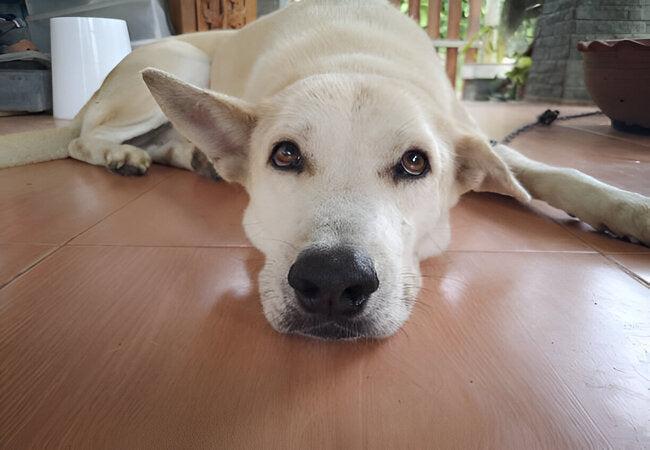2025 Vet Alert: Why Does My Dog Have a Swollen Face? 🐶⚠️

In this article
2025 Vet Alert: Why Does My Dog Have a Swollen Face? 🐶⚠️
By Dr. Duncan Houston BVSc
I'm Dr Duncan Houston BVSc, veterinarian and founder of Ask A Vet. A swollen face can indicate anything from a mild allergic reaction to a serious infection or tumor. In this 2025 guide, you'll learn what to watch for, possible causes, emergency signals, and step-by-step care—from vet visits to home remedies—to help your dog recover safely and comfortably. 😊
1. ⚠️ Why Facial Swelling Is Serious
Swelling may progress into areas that impact breathing (like throat or muzzle). Rapid onset or accompanying systemic signs demand urgent vet attention.
2. Common Causes & Their Signs
2.1 Allergic Reactions / Angioedema
- Triggered by bee stings, food, meds, vaccines, plants, insect bites.
- Signs: sudden swelling around eyes, ears, muzzle; hives; itching; vomiting or diarrhea.
- Treat with antihistamines or steroids—e.g., Benadryl (1 mg/lb) with vet advice; monitor breathing closely.
2.2 Dental Infections / Abscesses
- Bacterial infection near tooth roots causes unilateral swelling, pain, bad breath.
- Symptoms: reduced appetite, depression, fever.
- Treated with antibiotics, dental x-rays, and tooth extraction if needed.
2.3 Trauma & Bites
- Blunt trauma or animal bites cause bruising, swelling, and sometimes infection.
- Treatment: cold compress at home, vet exam, possible antibiotics or imaging.
2.4 Infections & Abscesses
- Non-dental abscesses from wounds or foreign bodies (e.g., grass awns) cause firm, sometimes draining masses.
- May involve Actinomyces (“lumpy jaw”)—treat with long-term antibiotics and possible surgery.
2.5 Salivary Mucoceles (Sialoceles)
- Damage to salivary glands creates soft swelling under the jaw or near the eye.
- Treated via surgical gland removal; prognosis is generally good.
2.6 Tumors & Growths
- Benign or malignant growths—masses may be firm, enlarging, or ulcerated; oral tumors lead to facial distortion.
- Veterinary diagnostics include biopsies, x-rays, CT/MRI, and specialized treatments.
2.7 Other Causes
- Salivary gland tumors, cysts, and immune‑mediated swellings.
- Snake or spider envenomation also triggers intense facial swelling.
3. When to See the Vet — Immediately!
- Difficulty breathing, collapse, pale gums
- Rapid-onset swelling involving the throat or eyes
- Severe pain, fever, lethargy, vomiting, or bloody diarrhea
- Draining pus, bite wounds, abscesses
4. What to Tell Your Vet
Include recent exposures: new treats, bites, medications, vaccines, trauma. Describe symptom onset, appetite changes, teeth issues, and breathing difficulty.
5. Diagnostic Workup
- Physical exam—check lymph nodes, eyes, and mouth.
- Blood work to assess infection or allergic response.
- Dental X-rays or head imaging.
- Fine-needle aspirate/biopsy of masses or abscesses.
- Allergy testing if swelling recurs.
6. Treatment by Cause
6.1 Allergic Angioedema
- Emergency epinephrine for airway compromise.
- Follow up with antihistamines, corticosteroids to control swelling.
- Prevent future exposure; consider allergy testing if recurring.
6.2 Dental Abscess
- Antibiotics, pain relief, dental cleaning/extraction under anesthetic.
- Post-op care includes NSAIDs and, soft diet for 7–10 days.
6.3 Trauma & Abscesses
- Drain pus, prescribe antibiotics, and pain meds.
- May require debridement or removal of foreign bodies.
6.4 Sialocele
- Surgical gland removal; post-op care with antibiotics and soft food.
6.5 Tumors
- Surgical removal is advised; some cases need radiation or chemotherapy.
- Prognosis depends on tumor type and treatment timing.
7. Home Care Tips
- Cold compresses for mild swelling.
- Administer vet-prescribed medications precisely.
- Offer soft, palatable food.
- Monitor breathing, swelling, eating, and pain levels.
- Prevent itching or face rubbing—consider a cone or soft e-collar.
8. Prevention & Wellness
- Routine dental care—brushing, dental chews, exams.
- Year-round parasite control to minimize bite risk.
- Allergy avoidance—monitor food, meds, and environment.
- Supervise hikes or outdoor play to avoid bites and trauma.
- Regular vet wellness exams catch subtle issues early.
9. Ask A Vet Support & Products
The Ask A Vet app offers:
- 24/7 vet chat for urgent swelling assessment
- Telehealth follow-ups and first aid guidance
- Product recommendations: antihistamine formulations, soft cone e-collars (Woopf), pain relief granules (Purrz)
- Medication reminders and scheduling tools
10. FAQs on Swollen Face in Dogs ❓
- Q: Can I give antihistamines at home?
- A: Benadryl (diphenhydramine, 1 mg/lb every 8 h) is OK for mild swelling—but NEVER give without vet okay, and stop if vomiting begins.
- Q: Are facial tumors always cancer?
- A: No—some are benign (like cysts or lipomas), but any persistent mass needs veterinary evaluation.
- Q: How urgent is it?
- A: If swelling is rapid, near airways, or affecting breathing, seek emergency vet care immediately—this is life‑threatening.
- Q: Will ice/cold packs help?
- A: Yes—apply for 10 min, 2–3×/day for mild swelling, but don’t rely on it without vet diagnosis.
🏁 Final Vet Wisdom from Dr Houston
A swollen face is a visible call for help. It's essential to identify the cause quickly—whether allergy, infection, abscess, trauma, or tumor. Early vet intervention paired with home management ensures the best outcomes and comfort for your dog. With Ask A Vet's expert support and calming care products, swelling can be handled effectively and compassionately. Your pup’s health matters—act swiftly, stay observant, and reach out for help. 🩺💙
Download the Ask A Vet app for 24/7 help, medication guidance, and relief products like Woopf's e-collars and Purrz's gentle anti-inflammatory mixes. Your dog’s comfort is just a tap away! 📱






